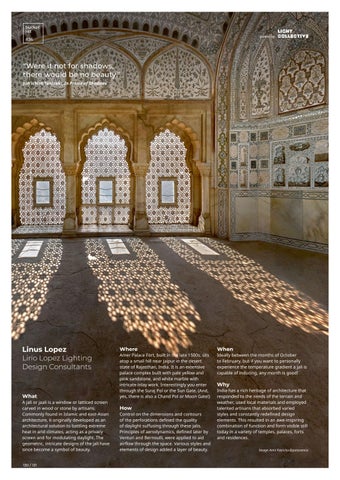bucket list curated by
#36
“Were it not for shadows, there would be no beauty.” Jun’ichirō Tanizaki, In Praise of Shadows
Linus Lopez Lirio Lopez Lighting Design Consultants
What
A jali or jaali is a window or latticed screen carved in wood or stone by artisans. Commonly found in Islamic and east-Asian architecture, it originally developed as an architectural solution to battling extreme heat in arid climates, acting as a privacy screen and for modulating daylight. The geometric, intricate designs of the jali have since become a symbol of beauty. 130 / 131
Where
Amer Palace Fort, built in the late 1500s, sits atop a small hill near Jaipur in the desert state of Rajasthan, India. It is an extensive palace complex built with pale yellow and pink sandstone, and white marble with intricate inlay work. Interestingly you enter through the Suraj Pol or the Sun Gate. (And, yes, there is also a Chand Pol or Moon Gate!)
How
Control on the dimensions and contours of the perforations defined the quality of daylight suffusing through these jalis. Principles of aerodynamics, defined later by Venturi and Bernoulli, were applied to aid airflow through the space. Various styles and elements of design added a layer of beauty.
When
Ideally between the months of October to February, but if you want to personally experience the temperature gradient a jali is capable of inducing, any month is good!
Why
India has a rich heritage of architecture that responded to the needs of the terrain and weather, used local materials and employed talented artisans that absorbed varied styles and constantly redefined design elements. This resulted in an awe-inspiring combination of function and form visible still today in a variety of temples, palaces, forts and residences. Image: Amit Pasricha @panoramist
